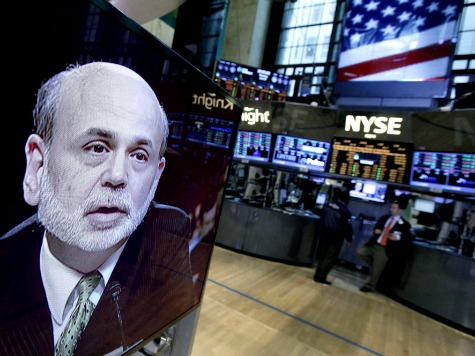
There is a lot of commentary in the press about who is responsible for the government shutdown and the near-miss with respect to extending the debt ceiling. The leading culprit is the Tea Party movement, a bunch of right-thinking Americans who are foolish enough to believe in the libertarian principles upon which our nation was founded. But blaming the Tea Party for the fiscal gridlock in Washington is dead wrong.
Next comes Texas Republican Ted Cruz, who conducted a one-man demonstration on the floor of the US Senate against fiscal dysfunction in Washington — this in an effort to derail the Obamacare law. For his efforts, Cruz earned the derision of conservative Washington insiders for daring to threaten the Fed’s artificial life support program with a real live financial crisis. He also earned the disdain of most establishment Republicans in the process.
“Ted Cruz and the people around him said that anyone who didn’t follow his direction on this was a Nazi appeaser… if you didn’t take his tactic, you owned Obamacare,” Grover Norquist, head of Americans for Tax Reform, told “The Steve Malzberg Show” on Newsmax TV. “No one’s questioning his conservative credentials. It’s his wisdom and his judgment and the name-calling that he has thrown at every Republican in the House and the Senate,” Norquist told Newsmax.
Senator Cruz had his heart in the right place, but sadly his actions tend to support the notion that the Republican efforts to block Obamacare by using the threat of a fiscal crisis were ill advised. But blaming decades of fiscal dysfunction in Washington on the Tea Party or either institutional political party is also dead wrong.
My friend Barry Ritholtz, a savvy fund manager and left-wing Democrat from New York who edits The Big Picture, complains that the Republicans are to blame. “There is ordinary gridlock, and then there is expensive, pointless, nihilism,” he argues. “We have crossed the Rubicon from former to latter.” But such views miss the larger point, namely that America’s political system, like Greece and Rome before us, had been broken by massive currency debasement and debt.
First, the Founders of the United States wanted gridlock. As we noted in the last issue of Washington & Wall Street, the Madisonian principle of “checks and balances” requires conflict. But the few conservatives who tried to use a fiscal confrontation to change Washington’s chronic fiscal disarray are hopelessly optimistic. The single party tendency that actually governs Washington wants nothing save continuance in power. That is why less than 1 in 10 Congressional seats up in 2014 will be competitive.
Second, the real enabler of gridlock in Washington is not the Republicans or the Democrats, but the Federal Open Market Committee. The US central bank has enabled Congress to ignore festering political issues for decades, really going back to the 1990s. It has been a quarter century, let us recall, since we had anything like full employment in the US. By using low interest rates to paper over the federal debt and excessive spending that continues even today, the Fed created a fantasy land atmosphere in Washington where neither party feels any pressure to compromise.
“The Fed is the primary engine of instability in the US,” argues my friend David Stockman, who appeared before me at a conference in New Orleans earlier this week. “We have no fiscal process, no budget. The FOMC is contributing to gridlock by telling members of both parties that ‘the Fed will take care of it.’ The twin policies of quantitative easing and financial repression have distorted the American political system and encourage irresponsible ideologies within both parties.”
Stockman notes that the FOMC has mutated into a Soviet style politburo that is now the key political force in Washington. The threat to American democracy posed by accommodative policies of the FOMC is quite deadly. Francis Fukuyama, in his 2006 essay, “After Neoconservatism,” noted that “Leninism was a tragedy in its Bolshevik version, and it has returned as farce when practiced by the United States.” Fukuyama’s rejection of the neocon ideology began with his famous “End of History” essay, which presented a kind of Marxist argument for the existence of a long-term process of social evolution, but one that terminates in liberal democracy rather than totalitarian communism.
Like George Orwell, Fukuyama makes the mistake of believing that it is possible to have a socialist economic formulation without an authoritarian political result. Orwell, who was a socialist all of this life, wrote Animal Farm as a critique of Soviet communism, but not a general refutation of socialism. He still held out hope of achieving a socialist utopia in Britain without the need for political repression. In the US, however, under the dictatorship of the economists at the Fed, we have achieved economic socialism via the financial repression of zero interest rates rather than the political tyranny of firing squads or the Soviet gulag.
The whole notion of “gridlock” implies that America is a functioning democracy. That, at the end of the day, is the real question. So when you hear members of the Big Media complain about the Tea Party or Ted Cruz causing “gridlock” in Washington, remind them that the Federal Open Market Committee is really in charge of the US political system. All of the worst fears about the political danger of a central bank going back to President Andrew Jackson have been realized.

COMMENTS
Please let us know if you're having issues with commenting.